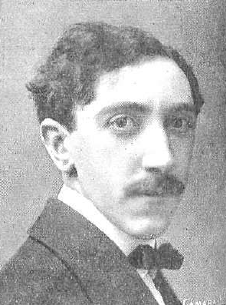 |
| Jesús Guridi in 1915 |
Fiesta - Falla, Turina, Guridi, Granados; Lucy Anderson, Dan D'Souza, Sofia Kirwan-Baez, Dylan Perez; Re-Sung at Church of St John the Divine, Kennington
Reviewed by Robert Hugill on 1 December 2021 Star rating: (★★★★)
A group of young performers in an engaging recital, bringing the warmth of Spain into a cold Winter's evening and encouraging us to explore 20th century Spanish song
The Autumn season of Re-Sung, pianist Dylan Perez' song recital series at the Church of St John the Divine, Kennington, came to an end on Wednesday 1 December 2021 with Fiesta, a programme of Spanish songs by Manuel de Falla, Joaquin Turina, Jesus Guridi and Enrique Granados, sung by Lucy Anderson, Dan D'Souza and Sofia Kirwan-Baez, Dylan Perez accompanied, as well as providing engaging spoken introductions to the songs.
We began with perhaps one of the best known works in the relatively small group of Spanish songs that are widely performed internationally, Manuel de Falla's Siete canciones populares españolas, seven Spanish folksongs that Falla arranged for voice and piano in 1914. Usually sung by a female voice, here they were intriguingly sung by baritone Dan D'Souza. With a resonant masculine voice singing the songs, with little of the flirtatiousness that female performers often bring, the result was a surprising refocusing of the music. Throughout the cycle, I was far more conscious of the Spanish words and the phrases they made than is often the case. By turns sonorous, serious and insouciant, D'Souza brought a different feel to the music from the vividly vibrant tones of 'Seguidilla murciana' to the sculptural phrases of 'Nana' and the joyful swagger of 'Cancion'. Throughout, D'Souza was finely partnered by Perez whose rhythmically alert performance complemented D'Souza's admirably.
 |
| Joaquin Turina in 1914 |
Jesús Guridi was a Spanish Basque contemporary of Falla and Turina. He trained in Paris (at the Schola Cantorum with Vincent d'Indy), Brussels and Cologne, and as a composer found inspiration both in the music of Wagner and in Basque folklore. His Seis canciones castellanas are, however, based not on Basque melodies but on traditional songs from the region of Avila which were originally collected for a film for which Guridi wrote the music. The Civil War interrupted work on the film and Guridi's songs were premiered as a cycle in 1939. Much of Guridi's Basque-inspired music was supressed under the Franco regime, however these Castilian songs were published in 1941 by the state publishing company and helped establish Guridi's name.
Here they were sung by Sofia Kirwan-Baez with a wonderful sparkle in her eyes. A very engaging performer, Kirwan-Baez brought out the vivid character of each of the songs, whilst Perez performance of Guridi's rather French-inspired accompaniments, full of fascinating harmonies and textures, helped to move the songs from folkloric to art-song.
Enrique Granados wrote two books of piano pieces inspired by the work of the painter Goya in 1911 and 1914. The music became so popular that he adapted it into an opera, Goscoyescas which premiered in 1916. La maja y el ruiseñor comes from the opera, and is a delightful depiction of a woman listening to a nightingale and wondering what it is singing about. Love, she concludes. Here Lucy Anderson sang the woman with affecting character and style, whilst Dylan Perez did sterling duty as the nightingale, conjuring Granados' magical sounds in the piano.
Never miss out on future posts by following us
The blog is free, but I'd be delighted if you were to show your appreciation by buying me a coffee.
Elsewhere on this blog
- Unsung Heroine: The Telling in music of Hildegard of Bingen and troubadour songs - record review
- Virtuoso instrumental focus: in Handel's Unsung Heroes, David Bates & La Nuova Musica highlight Handel's brilliant instrumental solos in his arias - record review
- A snapshot of London musical life in 17th and 18th centuries from Ensemble Hesperi at Temple Church - concert review
- The journey begins: Richard Jones and Martyn Brabbins launch a new Ring Cycle at ENO, dramatically anti-heroic yet with strong musical values and some intriguing ideas - opera review
- A Dangerous Obsession: The Relationship of Paul Verlaine and Arthur Rimbaud at the London Song Festival - concert review
- Following her passion: for Icelandic composer Anna Thorvaldsdottir writing music as a calling - interview
- A tremendous achievement: premiere of Cheryl Frances-Hoad's Scenes from the Wild as part of City of London Sinfonia's 50th birthday celebrations - concert review
- How I wonder what you are: RR Bennett, Hindemith, RVW, Schubert, Mussorgsky, Barber, and Alex Groves at Re-Sung - concert review
- In the Garden of Polyphony: Israel Golani performs French Renaissance music for lute and guitar on Solaire Records - record review
- From complex juggling patterns to cartoon sound-tracks to Melville's Moby Dick; the inspirations behind Ryan Latimer's vividly coloured and richly energised music are many and varied - record review
- A that Ring focuses on the big issue of today, the refugee crisis: Stefan Herheim's new production of Wagner's Ring cycle at Deutsche Oper, Berlin - opera review
- Light of Shore: debut disc from Belfast-based composer Anselm McDonnell - record review
- Home











No comments:
Post a Comment